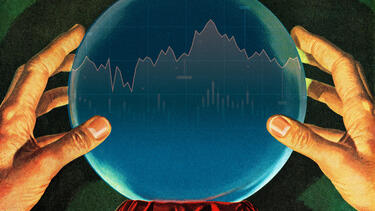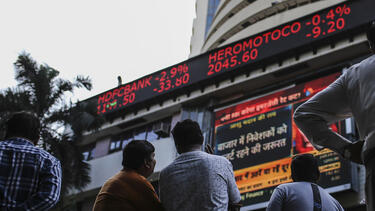Markets
What Does a Record Stock Market Mean?
We asked Yale SOM’s William Goetzmann, an expert on financial markets and the history of finance, what soaring stock prices say about the economy and the future of the markets.

Shining a Light into the Black Box of the Art Market
The opacity of the art market benefits a tiny elite of collectors, gallerists, and artists, says Yale SOM's Magnus Resch, but makes it harder for most artists and art lovers to connect.

Business Prognosticators Keep Getting It Wrong
Yale SOM’s Jeffrey Sonnenfeld explains the mistakes that analysts and forecasters make while trying to predict the future.

Did Crypto Cause the FTX Collapse?
Yale SOM’s Rick Antle, an accounting scholar who worked on the Bernie Madoff restitution, says that FTX was a toxic combination of a new asset and a failure of corporate controls.

Quickly Disclosing Bad News Could Help Companies Benefit from Market Signals
Consistently releasing negative forecasts promptly could change trader incentives and ultimately help a company gather more strategic information from the market, according to a new study co-authored by Yale SOM’s Zeqiong Huang.

What Sports Betting Teaches Us about Financial Markets
In a new paper, Tobias Moskowitz of Yale SOM finds that the sports betting market exhibits pricing patterns also seen in the stock market—suggesting that both may be subject to human irrationality.

Requiring Short Seller Disclosure Could Distort Markets
A study by Yale SOM's Frank Zhang suggests that requiring disclosures of short positions would lead some investors to make decisions based on others’ short positions, rather than information about a firm; this “herding” could drive stock prices away from their true value.

Study: Margin Trading Causes Stock Prices to Drop in Concert
During financial crises, stocks tend to fall together more than they should. A new study co-authored by Yale SOM’s Heather Tookes suggests that margin trading plays a substantial role in driving this downward spiral.

Study: Rising Seas Aren’t Causing Coastal Property Values to Decline
Climate change is causing sea levels to rise, threatening expensive waterfront properties. But according to a new study co-authored by Yale SOM’s Matthew Spiegel, prices are not falling in the areas most likely to be affected.

Why the Texas Power Market Failed
Texas-based energy economist Ed Hirs ’81 says the February 2021 power crisis exposed longstanding, fatal flaws in the state’s energy market design and oversight.

Is Bitcoin a Bubble?
The price of a single Bitcoin is up more than 700% since the beginning of 2020, defying years of predictions of a crash. We asked Prof. Aleh Tsyvinski, professor of economics at Yale, to shed some light on the continuing phenomenon.
